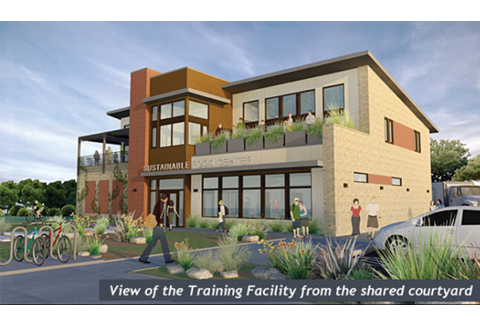Sustainable Food Center Keeps Austin Growing

Willie and Annie Nelson, along with Dan and Jean Rather, are the honorary chairs of the Sustainable Food Center’s Capital Campaign. A nonprofit organization, the Sustainable Food Center cultivates a healthy community by strengthening the local food system and improving access to nutritious, affordable food.
“SFC has been the Sustainable Food Center without a center for almost 40 years,” said executive director Ronda Rutledge. “On donated land in central east Austin, we’re building a training facility and a teaching garden to empower more children and families to grow, share, and prepare healthy, local food!”
The SFC is a Farm Aid partner, receiving grants from Farm Aid for their Farm Direct program as well as receiving funds to make disaster mini-grants to local farmers. The disaster mini-grants help with a variety of issues including drought.
According to Rutledge, the biggest local issue for farmers is that there is not enough production to meet the demand for locally grown, sustainable, and organic food. Rutledge noted that there are three certifications for farmers: Organic, Sustainable, and Conventional. “Organic” farming is the most rigorous and many organic farmers go with the less expensive “Sustainable” certification, even though many of them are in fact organic farmers. “Conventional” is the type of farming where pesticides and GMOs can be used.
“In terms of GMOs,” Rutledge said, commenting on Proposition 37 on the ballot in California, “it appears that while the AMA (American Medical Association) is not supporting GMO labeling, they are advocating for testing of genetically engineered foods—which is not happening at the rate that food-like substances are hitting the shelves,” said Rutledge. The GMO and labeling controversy is so important locally and nationally that the SFC Board of Directors approved a GMO policy statement for the organization.
Sustainable Food Center GMO Policy Statement:
SFC believes that communities can achieve food security without the use of GMOs and that not enough is being done to educate consumers and producers about the risks. Aggressive industry practices and bias towards genetic engineering technology by governmental agencies and educational, research, and extension institutions have led to increased use of Genetically Modified Organisms (GMOs), even as a growing body of data confirms the negative impact of GMOs on ecosystems, human and animal health, agricultural production, rural economies and vulnerable societies. Sustainable Food Center advocates for stricter testing requirements, stronger regulatory standards, and accurate labeling for Genetically Modified Organisms. Without full implementation of these changes, the use of GMOs will continue to undermine community food security and sustainability of food systems.






